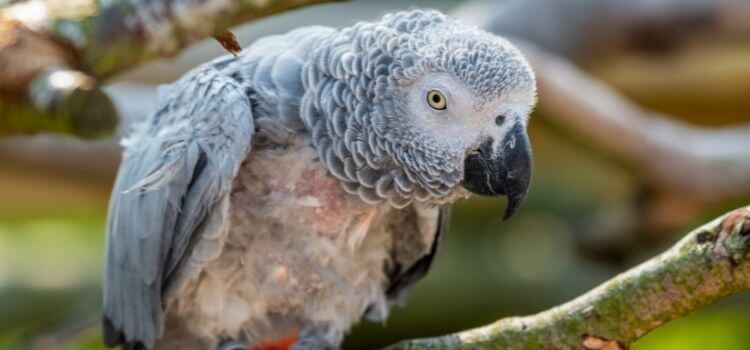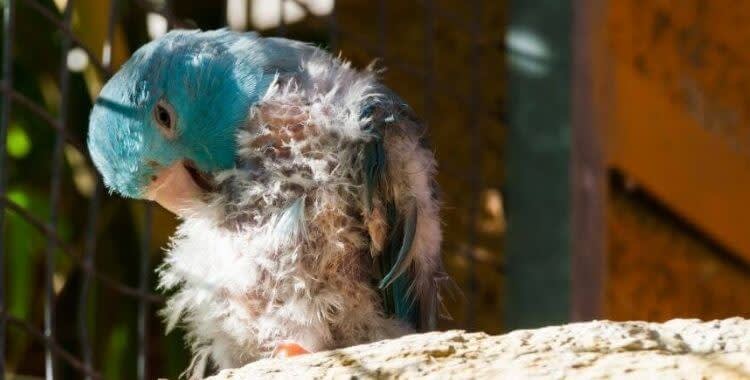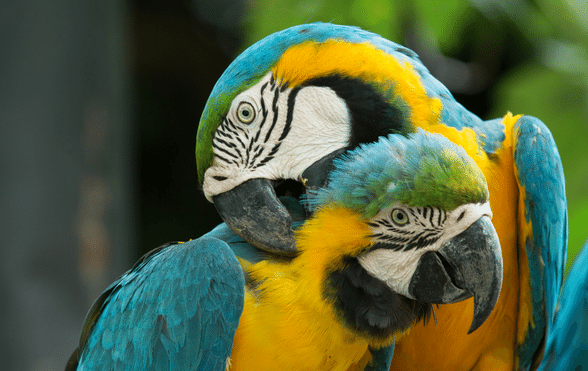Feather plucking is a worry for parrot owners. Dr Sophie Bell discusses causes, prevention and treatment
Is your parrot insured? Get a quote for up to £5,000 of vet fee cover, death and theft cover | We’ve been insuring exotic pets since 1996 | Check out our customer reviews on Feefo.
Why do birds pluck their feathers? | Behavioural reasons for feather plucking | Medical reasons for feather plucking? | Taking your parrot to see a vet | UV lighting can improve a Parrot’s psychological health? | What is a good diet for feather plucking | The use of bird collars
Feather plucking is often termed feather destructive disorder. It can be caused by a variety of underlying problems from disease to environmental problems or psychological issues.
It’s often a chronic problem that develops over time and a full clinical work-up will be required to identify the underlying cause for the feather plucking.
On some occasions the loss can be acute with no signs of the bird self-mutilating.
This can be alarming and will require immediate veterinary attention. It is important to keep the bird warm, in dim light and use saline on any skin wounds whilst you seek help.
African Greys are known for feather plucking, especially during their younger years. Once again, a full clinical exam will be needed to establish the cause.
Sometimes behaviour modifying drugs are required to address the issue.
If the problem is psychological, the feathers around the head will be unaffected as the bird is unable to pluck the feathers from this area.
Feather plucking is usually defined as a condition that occurs in captive birds only and rarely occurs in wild birds.
 African Grey’s are known for feather plucking
African Grey’s are known for feather plucking
Why do birds pluck their feathers?
Three of the main reasons that often lead to birds plucking their feathers include: Behavioural, medical, and environmental.
Behavioural reasons for feather plucking
- Stress
- Boredom
- Habit
Medical reasons for feather plucking
- Fungal disease such as ringworm
- Cancer
- Liver disease
- Respiratory problems
- Viral and/or bacterial skin infections
- Worms – this may require faeces testing
- Feather cyst – similar to a human in-growing hair
- Psittacine beak and feather disease
- Giardiasis – a protozoal infection not common in the UK
Environmental causes
- Allergies including to food
- Poor nutrition
- Low humidity which can cause dry skin
- Nicotine
- Lack of natural sunlight
- Lack of quiet space for rest
- Damage from other birds
 Feather plucking can be caused by environmental, health or psychological reasons
Feather plucking can be caused by environmental, health or psychological reasons
How to create the right environment
Humidity: Keeping a humid dust free environment is important to prevent the skin drying out.
You can also periodically spray a bird’s feathers with some warm water to prevent them from becoming brittle, usually 2-3 times weekly or provide a bath if your bird enjoys it.
Mental stimulation: Providing a mentally stimulating set-up is important to prevent boredom. It’s important to have a routine playtime planned, provide parrot friendly items to chew and toys to entertain. As well as some background noise such as a radio.
However, overstimulating a bird can lead to them to becoming tired and stressed which can result in feather plucking. Do allow for quiet time and rest without noise and with controlled lighting.
Breeding behaviour: During the breeding season, you may notice your bird’s mate plucking feathers around the head and neck, this is deemed as normal behaviour.
Lighting: Low lighting for short periods is a good thing, however long-term lack of light can lead to poor feather growth. Be sure to have a set lighting routine, and consider investing in UV lights. UV is important for your birds’ psychological and physical health.
Stress: Where you can, reduce and recognise stress. If for example a dog barking causes your bird to start plucking, get this under control.
Recognise behavioural changes from external stimuli and make appropriate changes.
Wounds and parasites: Make sure you examine your birds’ skin regularly. You should look for evidence of external parasites, signs of dry or irritated skin and wounds. These can lead to your parrot plucking.
Smoking: If you or another person in your household smokes, nicotine can irritate your birds’ skin and lead to plucking.
This can be caused by your bird directly being subjected to cigarette smoke but also by being handled by those with nicotine on their hands. Wash your hands thoroughly and avoid handling your bird after smoking.
Taking your parrot to see a vet
If you take your bird to see a vet due to feather plucking, a full in-depth clinical history will be taken. You can find a vet here.
It will explore the bird’s environment, along with noting any other clinical signs you may have seen.
If the condition has been brought on by a medical problem, you’re likely to have noted other clinical signs such as changes to the urates, depression, anorexia, jaundice and respiratory problems.
Your bird will be checked for external parasites and their diet will be discussed.
Bloods may be taken to look at a variety of parameters including liver and kidneys and signs of infectious agents.
Any underlying medical conditions will be treated and this should play a role in helping with the feather plucking.
It’s important to note that it will take some time to see a difference in the behaviour and condition of your bird.
If the problem of feather plucking is psychological in nature, behavioural modifying drugs can be used as treatment.
In more severe cases, birds can be sedated. Sedation is generally safe but will be undertaken in a controlled environment with the supply of oxygen at a veterinary hospital.
Birds require a dosage that causes sedation in order to deter feather plucking.
One option to avoid the use of sedation and minimise the risk is by focussing on your bird’s lifestyle.
This approach is more holistic and takes into account it’s environment, diet, and general well-being.
However, even birds kept in optimum conditions can still suffer feather destructive disorder.
UV lighting can improve a parrot’s psychological health
UV light is important for the well-being of parrots. The correct levels of UV light are widely known to provide a range of health benefits. You can learn more about the importance of the correct lighting here.
UV light can help prevent destructive behaviour like feather plucking as well as improving appetite, feather condition and overall health. UV light also plays a role in improving a bird’s psychological state.
There are lots of different UV bird lights available on the market. These lights will provide the correct levels and balance between UVA (Ultraviolet A) and UVB (Ultraviolet B) light. You can learn how to choose the correct UV lights here.
Normal lights used within the home will not provide UVA or UVB and this is why you’ll need a UV light.
UVB light is not as intense as UVA and it is unable to pass through glass or a window; so unless your parrot is outside in the sunlight, they will not benefit from UVB.
For birds to grow and have strong healthy bones they need calcium. To metabolise calcium, they require vitamin D3, and to synthesise vitamin D3 they need UVB! You can learn more about
UVA is especially important for a parrot’s eyesight. It helps ensure that they can see colour; without it they could be colour blind.
This can affect their appetite as they cannot identify foods which could lead to psychological disorders such as feather plucking.
UV lighting needs to be positioned correctly, depending on the power of the lamp you choose, but generally needs to be approximately 20 to 38cm away from your bird for it to work effectively. Learn more about where to position UV lighting here.
The use of bird collars
After the underlying causes of feather plucking have been identified, and recovery is underway. You may want to consider applying a collar.
Some birds will try and get them off and may find them stressful, but they can help prevent further feather plucking.
Collars, particularly foam ones, work well. However, if it’s an emergency where your bird cannot be preconditioned to it, it’s advised to have them fitted by a vet.
Collars can be distressing for some birds and it can take a long time until they get used to them.
Some birds may start to throw themselves around and risk an injury to themselves.
Therefore, collars can be used as a last resort if feather plucking continues.
For milder cases of feather plucking, a soft fleece style collar can be more appropriate.
But whichever collar is used, it is a good idea as a parrot owner to perhaps get your healthy bird used to wearing a collar over time in case they ever need one placed.
Placement of a collar usually requires two people, one to hold the bird and the other to apply.
What is a good diet for feather plucking?
A detailed exploration and consideration of the diet is important. Diets lacking vitamin A, calcium, and zinc (too much zinc can also be problematic) can cause poor feather quality and skin disorders leading to plucking.
Overfeeding or using high dietary fat will cause obesity which can also play a role.
Birds fed predominately seed which is high in fat and low in vitamin A will be at risk.
Diets should be varied and include a mix of fresh fruit, vegetables, and flowers.
Care should be taken to check the flowers you choose as they must not be poisonous to your parrot.
Any fruit that is given should be in moderation due to their high sugar content.
Is your parrot insured? Get a quote for up to £5,000 of vet fee cover, death and theft cover | We’ve been insuring exotic pets since 1996 | Check out our customer reviews on Feefo.

